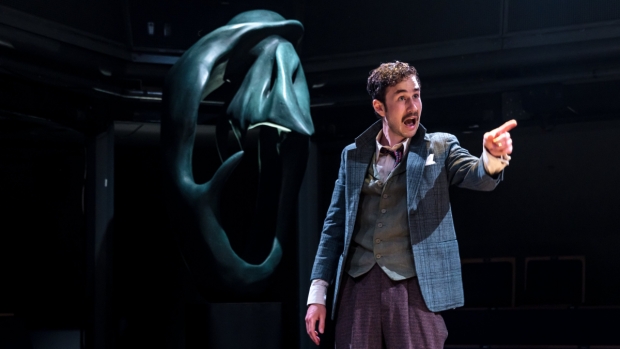The False Servant at Orange Tree Theatre – review
Paul Miller’s production runs until 23 July

© The Other Richard
Considering that Pierre Marivaux wrote La Fausse Suivant in 1724, the sexual politics and attitudes to gender constraints feel remarkably up-to-date, as does the clear-eyed depiction of how financial greed can sound the death knell for romance and love. It helps of course that Martin Crimp's darkly sparkling version, first seen at the National in 2004, never sounds like a translation. The language has an elegant savagery that is immensely funny but also, at times, intensely wounding.
Director Paul Miller doesn't try to dress it up too much, allowing the convoluted plot and witty, urbane characters to speak for themselves, and the production plays out stylishly on Simon Daw's attractive polygon setting, topped with a canopy of golden leaves, the maze etched into the stage floor a useful metaphor for the extensive intrigues afoot. The story centres on a woman posing as the son of an aristocrat to expose a serial heartbreaker's plan to ditch his current lover in favour of a richer one who is in fact the woman dressed up as a man (got that?!), and has a refreshingly nuanced take on gender fluidity and sex as a motivating force. This is all the more extraordinary when one considers that the play is nearly three hundred years old.
Part of the plan of the disguised Chevalier (Lizzy Watts, dazzling) is to get the Countess (beautiful, melancholic work from Phoebe Pryce) to fall for her (him!) thereby protecting her finances from Julian Moore-Cook's sexy but nasty mercenary Leilo. Fascinatingly, Miller suggests that the feelings between the two women may turn out to be completely genuine after all, which adds another layer to an already rich theatrical cake.
The play's ambiguous title could refer to a number of the characters, but Will Brown and Silas Wyatt-Barker are tremendous fun as a pair of actual servants caught up in the intrigue, and both privy to the fact that the Chevalier is not as he seems. Brown in particular invests the opportunistic Trivelin with a wayward charm and reckless amorality, tempered with an underlying edge of aggression, that transcends the comedy into something authentically compelling. He's astonishing.
If the plot machinations on offer here are challenging for modern audiences, it's a play and production that amply repay the effort to engage. The brilliance of the dialogue and performances, and the rambunctious humour, mean that it's impossible not to have a good time. But it's the insights into erotic thrall and the casual cruelty of apparently civilised human behaviour that really surprise. Strongly recommended.












